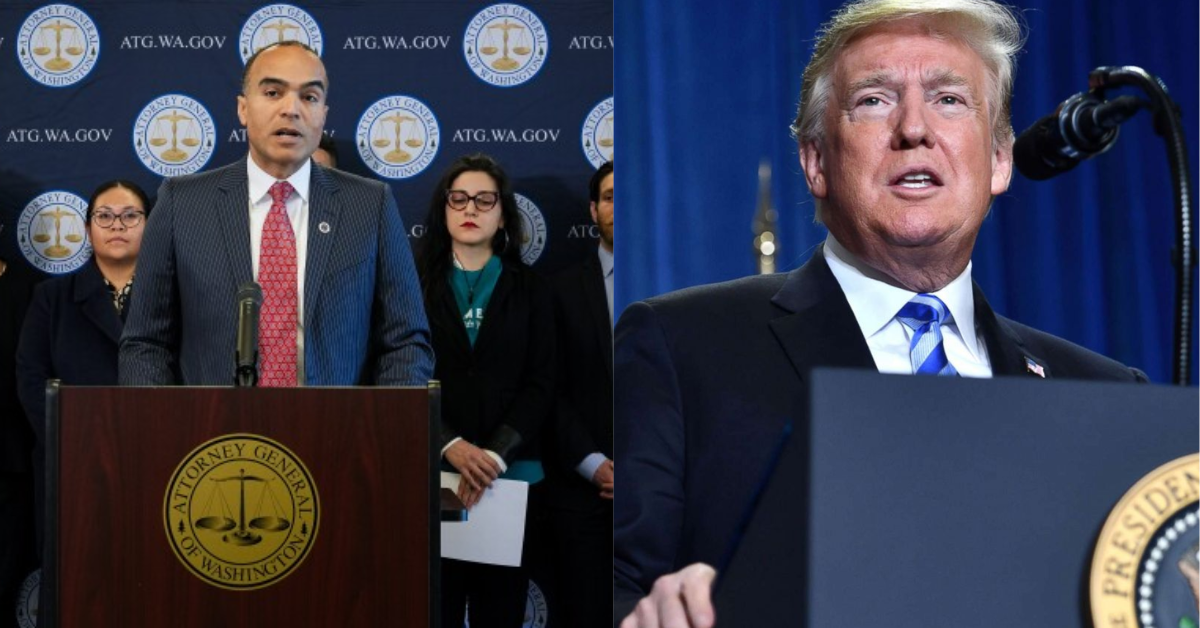A U.S. District Judge on Thursday temporarily blocked President Donald Trump’s executive order that sought to redefine birthright citizenship. The judge called the executive order “blatantly unconstitutional” during the first hearing in a multi-state lawsuit challenging the order.
The executive order, which was signed by President Trump, aimed to limit birthright citizenship, a principle that has been in place for generations. However, Judge John Coughenour expressed strong opposition to the order. He repeatedly questioned a lawyer from the Department of Justice (DOJ), asking how they could argue that the order was constitutional. Despite the lawyer, Brett Shumate, requesting more time to present a full briefing, Coughenour made it clear that the hearing was the time to present arguments.
The temporary restraining order, supported by the states of Arizona, Illinois, Oregon, and Washington, applies to the entire country. This lawsuit is one of five filed by 22 states and several immigrant rights groups across the U.S. The lawsuits feature personal stories, including testimonies from U.S.-born attorneys general and pregnant women worried that their children would lose citizenship.
Judge’s Reaction and Legal Challenge
Judge Coughenour, a Ronald Reagan appointee, strongly criticized the executive order, saying that it “boggles the mind” and is “blatantly unconstitutional.” He noted that he has been serving as a judge for over 40 years and could not recall any other case where an action violated the Constitution so clearly. The judge’s skepticism was evident as he pressed the DOJ attorney to justify the legal standing of the order.
In response, Shumate, representing the DOJ, disagreed with the judge’s assessment and asked for a chance to present a full argument. He argued that the order, which is set to take effect on February 19, was in line with the 14th Amendment of the U.S. Constitution, which grants citizenship to all persons born or naturalized in the U.S.
Arguments for and Against the Order
The lawsuit argues that Trump’s executive order, which attempts to redefine birthright citizenship, contradicts the 14th Amendment. This amendment, ratified in 1868 after the Civil War, guarantees citizenship to anyone born in the U.S. and subject to its jurisdiction. The plaintiffs in this case argue that the order could harm hundreds of thousands of people, particularly children born in the U.S. to non-citizen parents.
Lane Polozola, an attorney representing the states, criticized the government’s argument that children of undocumented parents should not be granted U.S. citizenship. He referred to the government’s position as “absurd” and raised the question of whether children born to parents living in the country illegally are not subject to U.S. laws.
He also emphasized that if the order were allowed to take effect, states would have to revamp their healthcare and benefits systems to reflect the new citizenship status of children born to non-citizen parents.
Polozola further argued that birthright citizenship has been a law for generations and that the executive order could lead to significant confusion and potential harm for families across the country. He warned that births cannot be paused while the court considers the case, and that a restraining order was necessary to prevent immediate harm.
The Trump Administration’s Defense
The Trump administration, however, maintains that the executive order is in line with U.S. law. In a statement, the Department of Justice expressed its intention to “vigorously defend” the order, arguing that it correctly interprets the 14th Amendment. They stated that the order would not impact children born before its implementation date of February 19 and that it would only apply to future births.
Republican lawmakers have also expressed support for the president’s stance, with some suggesting that the executive order could eventually be codified into law. They argue that birthright citizenship should be restricted to children born to legal immigrants, not to those born to parents living in the country illegally.
The Legal Precedent and Public Response
The issue of birthright citizenship has long been debated in the U.S. A landmark case in 1898, Wong Kim Ark v. United States, established that children born in the U.S. to immigrant parents are U.S. citizens. This case involved Wong Kim Ark, who was born in San Francisco to Chinese immigrants. Despite facing challenges upon reentry into the U.S. after traveling abroad, the Supreme Court ruled that Ark was a U.S. citizen by birthright.
Some supporters of stricter immigration policies argue that the Wong Kim Ark case only applies to children born to legal immigrants. They claim that the application of birthright citizenship to children of undocumented immigrants is less clear.
Connecticut Attorney General William Tong, who is a U.S. citizen by birth, has expressed concern over the impact of the executive order, stating that the issue of birthright citizenship is deeply personal for him. He emphasized that the Constitution and the law are clear on this matter and that the president’s actions would cause unnecessary harm to American families, particularly those with immigrant backgrounds.
Impact on Families and Immigrants
One of the lawsuits includes a case involving a pregnant woman, “Carmen,” who has lived in the U.S. for more than 15 years. Although she is not a U.S. citizen, Carmen has a pending visa application that could lead to permanent residency. The lawsuit argues that stripping children of birthright citizenship would cause significant harm, denying them full membership in U.S. society.
The Trump administration’s efforts to redefine birthright citizenship have sparked widespread debate. While some argue that it is a necessary step to address illegal immigration, others believe it undermines the fundamental principles of American citizenship. As the case continues to unfold, the outcome will likely have far-reaching implications for the future of birthright citizenship in the U.S.
Disclaimer: This article has been meticulously fact-checked by our team to ensure accuracy and uphold transparency. We strive to deliver trustworthy and dependable content to our readers.

